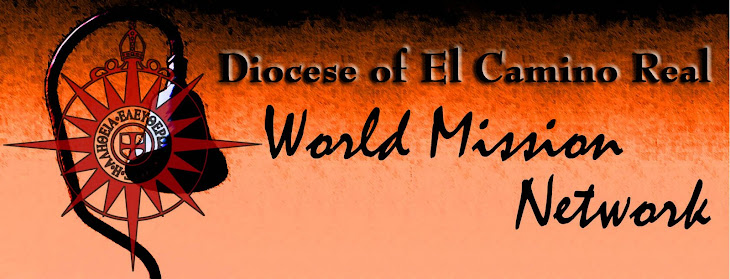From Robin Denney, Sudan:
Dear Friends,
I love the purple seasons. Both Advent and Lent are seasons of preparation and anticipation. When I was little I always liked saving the best for last, I would even peel the fried breading off the chicken nuggets to eat it last, because it was my favorite part. The anticipation of something wonderful somehow magnifies the wonder of it.
In Sudan there are no Christmas carols yet, no decorations, no talk of presents. The hot wind carries clouds of dust and smoke that herald the beginning of the dry season. It is 90 degrees indoors, and it is hard to remember that this is December. But many people are anticipating their trips home for Christmas, to their villages or the cities where their children live to spend long awaited time together.
I am preparing to finish my first year in Sudan. I came in January, and I’m going home in less than two weeks now for Christmas, and to visit my family, friends, and churches (see schedule below). My anticipation is very great! My nephew, who is two, can speak in sentences now, my sisters and I have already planed what movies we are going to see, my mom has a menu of all my favorite foods planned, and my dad is lending me a car to get from place to place. I can’t wait to spend time with them all. And the yearning is wonderful.
There is a feeling of anticipation present in Sudan these days. Anticipation of the unknown future of this country. Hope for peace, fear of war. Next year is an important year in the history of Sudan, the next 13 months will shape the future of this nation, the possibility of democratic elections for the first time in decades, and a decision as to whether there will be one country or two. Amidst this uncertainly, the LRA rebels continue to attack and kill in Western Equitoria state, and tribal conflict continues in much of the south.
In the last month I attended 3 services consecrating or installing new bishops. They were wonderful services (which lasted an average of 6 hours). There was much singing and dancing, much joy and celebration, and much hope for the future of the Church. No matter what happens, the Church will be here, ministering to the people, of the people. There is great hope in that. Nothing can separate us from the love of Christ.
I met some people this month who inspire me. One woman, wife of one of the Bishops, told me about how her community lives under threat of the LRA constantly. Her older children are away at boarding school, but she must keep her two-year-old son with her all the time, because she is afraid to part from him. Two of her nieces were kidnapped by the LRA almost a year ago, and there is no news of them. The terrible weight of this suffering is something I would think impossible to bear. And yet, there is still laughter, there is still joy in the midst of this suffering. She told a story about a visit she had to the United States. It was wonderful to hear her impressions of Walmart, and snow, and the food, and the first obese person she had ever seen. She was so surprised and in wonder at everything she saw, and the way she told the story had us all laughing.
I also met a couple missionaries who have been here for more than 10 years. Their stories were sometimes harrowing, sometimes frustrated, but always full of reconciliation and hope. Their commitment, their presence, and their sense of peace was wonderful to be in the company of.
So as I wrap up my work for the year, turn my face toward home, and anticipate the birth of the Christ child, I am also contemplating the wonder and inspiration of Christ’s presence with us now, in all things, in all situations, great or small, fear or hope, we are not alone. We have the creator, the redeemer, the sustainer, the communion of saints past, and the presence of the saints in our lives today. We are the body of Christ alive in the world.
Love to you all, a wonder-filled Advent, and a joy-filled Christmas,
Robin
-----------------------
California Church Visit Schedule:
December 20 – St. Luke’s, Hollister
January 3- St. James, Paso Robles
January 17- St. Martin, Davis
January 18 – (evening) Faith Presbyterian, Sacramento
January 24 – St. Luke’s, Atascadero
January 31- Visalia Episcopal Church
Feb 7- St. Benedicts, Los Osos
Feb 14 – St. Richards, Lake Arrowhead
Feb 17 – (ash Wednesday) St. John’s, San Bernardino
Feb 21 – St. Barnabas, Arroyo Grande
Feb 28 – St. Stephens, San Luis Obispo
(More mid week events may be added).
Contributions:
If you feel called to support my presence in Sudan for the next year:
Checks to: St. Luke’s Atascadero Memo: “Missionary Fund”
Address: PO Box 1168, Atascadero, CA 93422
(If you would prefer to donate to special agriculture projects or scholarships, or other support to the Episcopal Church of Sudan, let me know, there are many opportunities).
Blog:
See my blog for other info and stories: http://robin-mission.blogspot.com/














